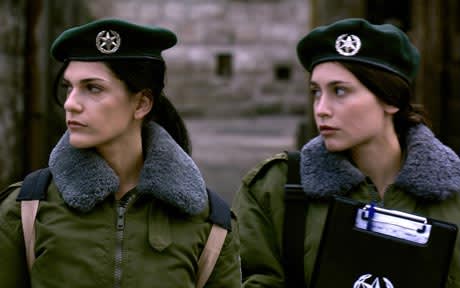The young recruits in Close to Homes all-female army division are hardly the doughty, self-abnegating warriors of myth aflame with the cosmic rectitude of their cause. These girls, unhappily performing their compulsory military service, are as unruly as a reform school dorm. Our focus is on Smadar and Mirit, two paired together 18-year olds to their mutual dismay on patrol in a Jerusalem neighbourhood, assigned to record identity card numbers from passing Palestinians. Smadar is the obstreperous bad girl; shes bitchy, disrespectful, a rule-flouter and shoplifter. (Using a Breakfast Club template, shes the Judd Nelson of the piece.) Mirit is dutiful, nerdy and deferential, the one girl who regards her duties with even a modicum of seriousness. (So, shes Anthony Michael Hall.) Neither the viewer nor they are ever told what is done with the information they desultorily collect, but it seems like make-work. Happily for all concerned, the Arabs are almost all acquiescent. The girls bicker about clothes, boys and cigarettes; they are, the filmmakers are at pains to emphasise, entirely typical. (The French title, Une Jeunesse Comme une Autre, helps with this point.) The one thing no one ever discusses an outbreak of actual violence of course comes to pass, spurring a slow equilibration of the two divergent personalities that occupies the second half of the movie. The independent Smadar seeks the comfort of family Mirits, as it happens and becomes more conscientious and less abrasive. Mirit loosens up, slacks off, chases a boy and gets in trouble. In the process, as one might imagine, some life lessons are learned. The theme that the viewer will likely be anticipating how war skews and accelerates young adulthood is not really developed. Indeed, Close to Home is entirely apolitical there are no pro-Israel screeds, no anti-Arab epithets. To all appearances, our leads are thoroughly inured to the latent horror of their situation. Our takeaway is thus an appreciation for the universality of youthful concerns, and some thoughts as to the malleability of teenage identity dont judge a soldier by her cover, that sort of thing. While all of this is doubtlessly worthy, none of it is actually all that compelling. There are no extras whatsoever, and though one is tempted to be catty about how airy and self-congratulatory these things ordinarily are, here some background and nuance as to the conditions on the ground would have been unusually helpful.
(Seville)Close to Home
Dalia Hager and Vidi Bilu

BY Paul DuderPublished Nov 9, 2007